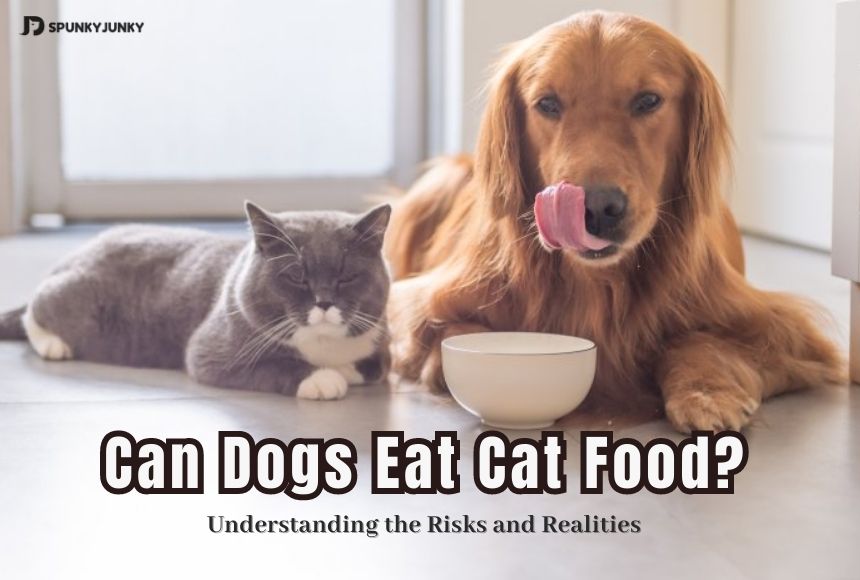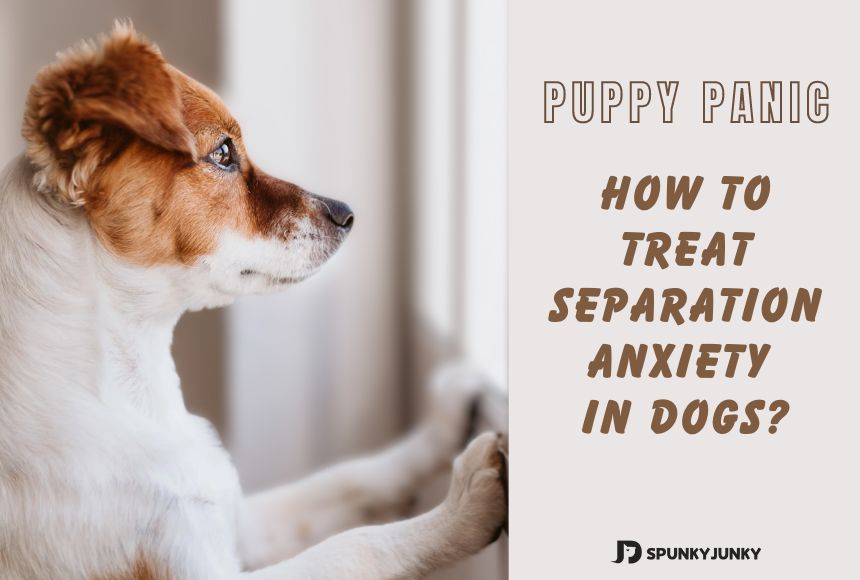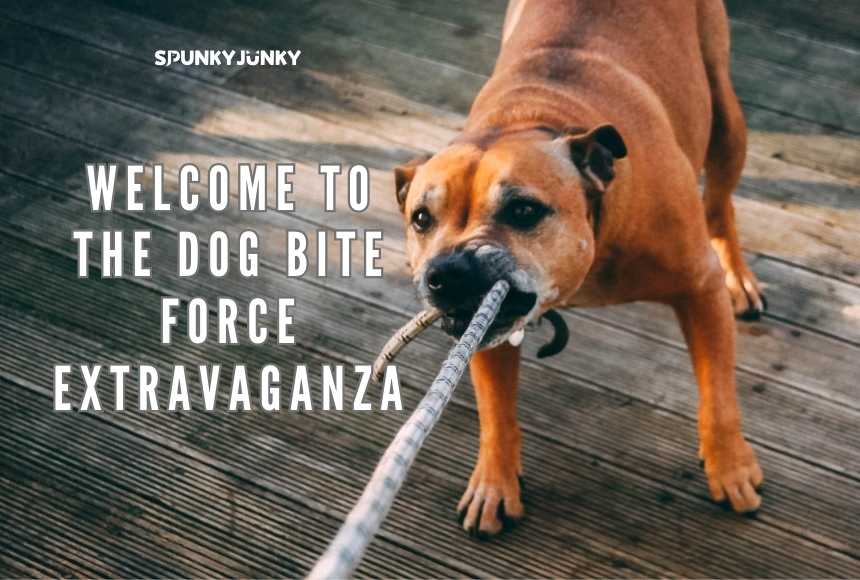Does your dog think the grass is greener on the feline side? It's a classic story of dog and cat food. But is it a match made in heaven or a disaster?
Picture this: Your dog's wagging tail guides them straight to the cat's food bowl. Oh, temptation! But wait, can dogs eat cat food?
Let's unravel this curious canine conundrum and uncover the truth about this cross-species food conundrum!
In this article, we'll break down "Can dogs eat cat food," "The bad of dogs eating cat food," and "How to stop dogs from eating cat food."
Ready to dig deeper? Let's get facts about dog and cat food and have fun!
Can Dogs Eat Cat Food?
Can Dogs Eat Cat Food? Cat food is divided into dry cat food and wet cat food. Next, let us understand each of them.
1. Can dogs eat wet cat food?
Ah, the temptation of wet cat food! While some dogs may find it delicious, it must be used cautiously. Cat food can be an alternative for puppies with specific needs, such as those battling health issues or needing extra calories. But please proceed with caution! Long-term cat food consumption may cause gastrointestinal problems such as diarrhea and flatulence. In addition, cat food is not designed for dogs, so long-term use may cause malnutrition or allergies.
2. Can dogs eat dry cat food?
Is your dog eyeing those crunchy cat treats? Dry cat food is healthier than human foods like chicken, peanut butter, or cheese. But wow, here's the catch: It's formulated for the nutritional needs of felines, not our fluffy dogs. It's high in meaty carbohydrates and lacks plant components. Plus, cat food is meant for cats with sharp teeth to chew, so it won't clean your dog's teeth as dry dog food can.
Is Cat Food Bad for Dogs?

Now, you know the answer to: can dogs eat cat food.
Picture this: a sneaky puppy trying to steal his feline sibling's food -- is cat food bad for dogs? Well, quite a lot, friends! While the occasional nibble may be harmless, here's why exposing your dog to cat food regularly can turn into a real "cat" disaster!
Too much protein:
Cat food is rich in protein and specially tailored for our agile felines. But for dogs, it's like binge-eating protein shakes 24/7! This high-octane diet can lead to trouble, including horrible pancreatitis, liver problems, fluffy fat, and cranky kidneys.
Nutritional imbalance:
Dogs are the foodies of the animal kingdom—they crave a well-rounded diet! While kittens need meat, our omnivorous canines thrive on a mix of meat, vegetables, and carbohydrates. So if your puppy is only eating cat food, they're missing out on these essential nutrients that can affect their growth and development.
Allergy:
Cat food is exclusive food for cats. Both cats and dogs have unique needs! Cat food may contain foods that are allergic to dogs, which can cause sneezing, itching, and stomach pains in dogs and may be life-threatening in severe cases.
In conclusion, while some occasional cat food might be fun for dogs, remember to provide your dog with a balanced diet designed just for them. Keep your dog happy and healthy.
Can a Dog Die From Eating Cat Food?
In the last section we discussed Is cat food bad for dogs? So can a dog die from eating cat food?
In general, occasional ingestion of cat food is not likely to cause serious harm to a healthy adult dog. However, cat food is formulated differently from dog food to meet the specific dietary needs of cats. It is higher in protein and fat, which may not be suitable for dogs in the long term. Regular cat food consumption by dogs can lead to health issues such as obesity, pancreatitis (inflammation of the pancreas), liver problems, and kidney issues due to the higher protein content.
While a single instance of a dog eating cat food is unlikely to be fatal, preventing them from regularly accessing cat food is essential. Continuous consumption of cat food can lead to nutritional imbalances and long-term health problems.
Suppose you suspect your dog has consumed a large amount of cat food or shows signs of gastrointestinal distress, such as vomiting or diarrhea. In that case, it's best to contact your veterinarian for advice and appropriate treatment.
Cat Food vs Dog Food: What's the Difference?
Cat food and dog food may look similar on the outside. But they really have a very big difference!
Cats are carnivores, which means they thrive on a diet rich in animal protein and require essential amino acids like taurine. Dogs are omnivores and enjoy a more varied diet that includes plant and animal components.
This distinction means cat food has a higher concentration of protein and fat, making it irresistibly delicious and aromatic for our dogs. However, cat food is mainly meat, which does not meet the dietary needs of dogs. Long-term consumption of cat food will make the dog's nutrition unbalanced, leading to many diseases.
How to Keep Dog From Eating Cat Food

After understanding the difference between cat food and dog food, let's go back to the topic: can dogs eat cat food? You already know the answer. So now let's tackle a question: How to keep dog from eating cat food?
If your dog is only occasionally interested in cat food, then don't worry. Just block it when appropriate. However, if your dog has grown fond of cat food, you may need some methods to prevent further consequences.
● Elevated Feeding: Place your cat's food in an elevated location and out of your dog's reach. Cats are natural climbers, and an elevated spot, such as a cat tree or shelf, can deter your dog from accessing the food.
● Separate Feeding Areas: Feed your dog and cat in different rooms. This way, you can closely monitor each pet's mealtime and prevent your dog from sneaking into the cat's food bowl.
● Use Baby Gates: Utilize baby gates or pet barriers to create designated areas for each pet during mealtime. This ensures your dog won't have access to the cat's food, and both pets can eat peacefully.
● Supervised Mealtime: If feeding your pets in the same area is unavoidable, supervise their mealtime closely. Direct your dog to their food while you watch the cat eat, and immediately remove the cat's food once they finish.
● Timed Feeding: Establish a schedule for your cat's mealtime. Feed them at specific times during the day and remove the food bowl once they're finished. Avoid free-feeding, as it allows your dog more opportunities to access the cat's food.
● Training and Commands: Train your dog to respond to commands like "leave it" or "stay." This will help you redirect their attention away from the cat's food and create boundaries during mealtimes.
● Secure Storage: Store the cat's food in a location inaccessible to your dog, such as a high shelf or a closet pantry. This prevents your dog from raiding the cat's food supply.
● Use Pet Sensors: Consider using pet sensors or smart feeders that only open for a specific pet's designated collar or microchip. This ensures that each pet receives its designated food without interference from the other.
By implementing these strategies, you can create a harmonious mealtime routine for your dog and cat, promoting a safe and healthy environment for both pets.
Final Thoughts
Well, guys, you have an answer to the question, "Can dogs eat cat food?"
In this article, we learn that while cat food may appeal to our canine companions, keeping their paws away from this feline treat is best. The difference between these two foods can cause many health problems in dogs.
Therefore, as a responsible pet owner, it is very necessary to understand the eating habits of cats and dogs. If you want to learn more about pets, check out our blog.






